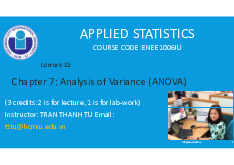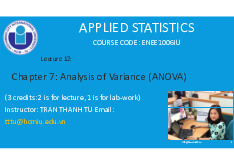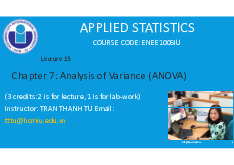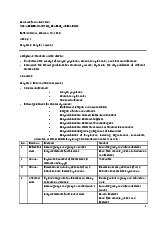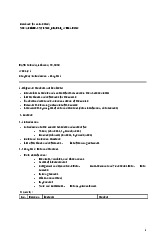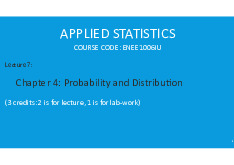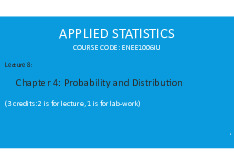Applied statistics (ENEE1006IU)
Danh sách Tài liệu
-
Analysis of Variance (ANOVA) | Bài giảng số 11 chương 7 học phần Applied statistics | Trường Đại học Quốc tế, Đại học Quốc gia Thành phố Hồ Chí Minh
123 62 lượt tải 21 trangANOVA (ANalysis Of VAriance) is a statistical method for determining the existence of differences among several population means. ANOVA is designed to detect differences among means from populations subject to different treatments (or set-up). ANOVA is a joint test. The equality of several population means is tested simultaneously or jointly. ANOVA tests for the equality of several population means by looking at two estimators of the population variance (hence, analysis of variance). Tài liệu giúp bạn tham khảo, ôn tập và đạt kết quả cao. Mời bạn đón xem.
Danh mục: Trường Đại học Quốc tế, Đại học Quốc gia Thành phố Hồ Chí MinhMôn: Applied statistics (ENEE1006IU)Dạng: Bài giảngTác giả: VietJack1 năm trước -
Analysis of Variance (ANOVA) | Bài giảng số 12 chương 7 học phần Applied statistics | Trường Đại học Quốc tế, Đại học Quốc gia Thành phố Hồ Chí Minh
185 93 lượt tải 18 trangn the other hand, when the null hypothesis is false, then MSTR will tend to be larger than MSE. So the ratio of MSTR and MSE can be used as an indicator of the equality or inequality of the r population means. This ratio (MSTR/MSE) will tend to be near to 1 if the null hypothesis is true, and greater than 1 if the null hypothesis is false. The ANOVA test is a test of whether (MSTR/MSE) is equal to, or greater than, 1. Tài liệu giúp bạn tham khảo, ôn tập và đạt kết quả cao. Mời bạn đón xem.
Danh mục: Trường Đại học Quốc tế, Đại học Quốc gia Thành phố Hồ Chí MinhMôn: Applied statistics (ENEE1006IU)Dạng: Bài giảngTác giả: VietJack1 năm trước -
Analysis of Variance (ANOVA) | Bài giảng số 13 chương 7 học phần Applied statistics | Trường Đại học Quốc tế, Đại học Quốc gia Thành phố Hồ Chí Minh
129 65 lượt tải 28 trangThe analysis of variance can be viewed as the process of partitioning the total sum of squares and the degrees of freedom into their corresponding sources: treatments and error. Dividing the sum of squares by the appropriate degrees of freedom provides the variance estimates, the F value, and the p-value used to test the hypothesis of equal population means. When we use analysis of variance to test whether the means of k populations are equal, rejection of the null hypothesis allows us to conclude only that the population means are not all equal. Tài liệu giúp bạn tham khảo, ôn tập và đạt kết quả cao. Mời bạn đón xem.
Danh mục: Trường Đại học Quốc tế, Đại học Quốc gia Thành phố Hồ Chí MinhMôn: Applied statistics (ENEE1006IU)Dạng: Bài giảngTác giả: VietJack1 năm trước -
Time series analysis and forecasting | Bài giảng số 14 chương 8 học phần Applied statistics | Trường Đại học Quốc tế, Đại học Quốc gia Thành phố Hồ Chí Minh
100 50 lượt tải 24 trangA time series is a sequence of observations on a variable measured at successive points in time or over successive periods of time. The pattern of the data is an important factor in understanding how the time series has behaved in the past. To identify the underlying pattern in the data, a useful first step is to construct a time series plot. A time series plot is a graphical presentation of the relationship between time and the time series variable; time is on the horizontal axis and the time series values are shown on the vertical axis. Tài liệu giúp bạn tham khảo, ôn tập và đạt kết quả cao. Mời bạn đón xem.
Danh mục: Trường Đại học Quốc tế, Đại học Quốc gia Thành phố Hồ Chí MinhMôn: Applied statistics (ENEE1006IU)Dạng: Bài giảngTác giả: VietJack1 năm trước -
Time series analysis and forecasting | Bài giảng 15 chương 8 học phần Applied statistics | Trường Đại học Quốc tế, Đại học Quốc gia Thành phố Hồ Chí Minh
171 86 lượt tải 20 trangCorrelation coefficient (r) measures the direction and strength of the linear relationship between two variables. The closer the r value is to 1.0 the better the regression line fits the data points. Coefficient of determination (r2) measures the amount of variation in the dependent variable about its mean that is explained by the regression line. provides a measure of the goodness of fit for the estimated regression equation. Tài liệu giúp bạn tham khảo, ôn tập và đạt kết quả cao. Mời bạn đón xem.
Danh mục: Trường Đại học Quốc tế, Đại học Quốc gia Thành phố Hồ Chí MinhMôn: Applied statistics (ENEE1006IU)Dạng: Bài giảngTác giả: VietJack1 năm trước -
Applied-statistics readme week2 ENEE1006IU | Trường Đại học Quốc tế, Đại học Quốc gia Thành phố Hồ Chí Minh
171 86 lượt tải 3 trangWeek #: 2. Chapter #: Chapter 1 (cont.). 1. Objective: Students will be able to: Understand the concept of sample, population, census, sample survey, and statistical inference. Memorize the ethical guidelines for statistical practice, especially the responsibilities of different stakeholders. Tài liệu giúp bạn tham khảo, ôn tập và đạt kết quả cao. Mời bạn đọc đón xem!
Danh mục: Trường Đại học Quốc tế, Đại học Quốc gia Thành phố Hồ Chí MinhMôn: Applied statistics (ENEE1006IU)Dạng: Giáo trìnhTác giả: VietJack1 năm trước -
Applied-statistics readme week1 | Trường Đại học Quốc tế, Đại học Quốc gia Thành phố Hồ Chí Minh
199 100 lượt tải 5 trangWeek #: 1. Chapter #: Introduction + Chapter 11. Objective: Students will be able to: Remember schedule and contents for this course in the whole semester. List textbooks and references for the course. Understand rules and evaluation criteria of the course. Discover the learning outcomes of the course. Memorize the principles of data and statistics (data classification, data sources). Tài liệu giúp bạn tham khảo, ôn tập và đạt kết quả cao. Mời bạn đọc đón xem!
Danh mục: Trường Đại học Quốc tế, Đại học Quốc gia Thành phố Hồ Chí MinhMôn: Applied statistics (ENEE1006IU)Dạng: Giáo trìnhTác giả: VietJack1 năm trước -
Introduction - Lecture notes 1 | Trường Đại học Quốc tế, Đại học Quốc gia Thành phố Hồ Chí Minh
208 104 lượt tải 9 trangINTRODUCTION TO THE COURSE - THEORY. INTRODUCTION TO THE COURSE - PRACTICE. INTRODUCTION TO THE COURSE Learning outcomes. Textbook: David R. Anderson, Dennis J. Sweeney, Thomas A. Williams, Jeffrey D. Camm, James J. Cochran (2017), Statistics for Business & Economics, 13th Edition, Cengage Learning, USA. Tài liệu giúp bạn tham khảo, ôn tập và đạt kết quả cao. Mời bạn đọc đón xem!
Danh mục: Trường Đại học Quốc tế, Đại học Quốc gia Thành phố Hồ Chí MinhMôn: Applied statistics (ENEE1006IU)Dạng: Bài giảngTác giả: VietJack1 năm trước -
Lecture 7: Chapter 4: Probability and Distribution | Trường Đại học Quốc tế, Đại học Quốc gia Thành phố Hồ Chí Minh
200 100 lượt tải 28 trang4.3. CONTINUOUS PROBABILITY DISTRIBUTIONS. A fundamental difference separates discrete and continuous random variables in terms of how probabilities are computed. For a discrete random variable, the probability function f (x) provides the probability that the random variable assumes a particular value. Tài liệu giúp bạn tham khảo, ôn tập và đạt kết quả cao. Mời bạn đọc đón xem!
Danh mục: Trường Đại học Quốc tế, Đại học Quốc gia Thành phố Hồ Chí MinhMôn: Applied statistics (ENEE1006IU)Dạng: Bài giảngTác giả: VietJack1 năm trước -
Lecture 8: Chapter 4: Probability and Distribution | Trường Đại học Quốc tế, Đại học Quốc gia Thành phố Hồ Chí Minh
201 101 lượt tải 29 trang4.4. SAMPLING AND SAMPLING DISTRIBUTIONS. The sampled population is the population from which the sample is drawn.The target population is the population we want to make inferences about. A frame is a list of the elements that the sample will be selected from. Tài liệu giúp bạn tham khảo, ôn tập và đạt kết quả cao. Mời bạn đọc đón xem!
Danh mục: Trường Đại học Quốc tế, Đại học Quốc gia Thành phố Hồ Chí MinhMôn: Applied statistics (ENEE1006IU)Dạng: Bài giảngTác giả: VietJack1 năm trước
